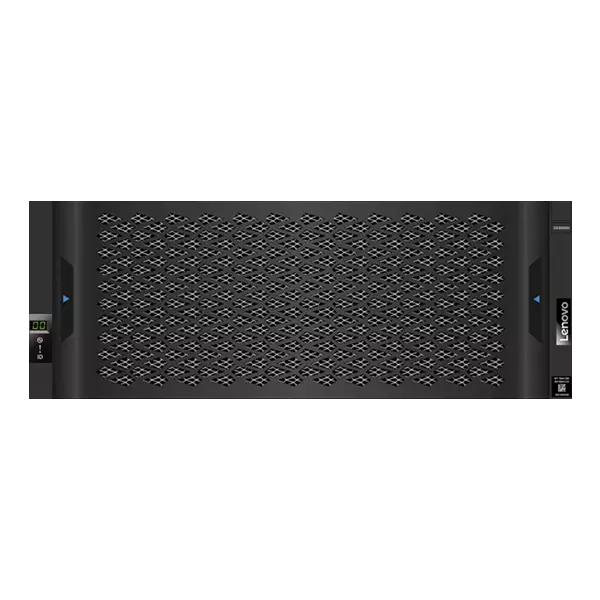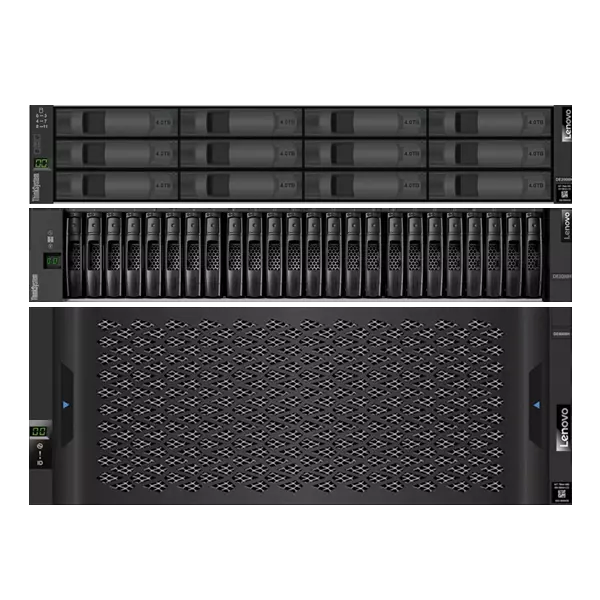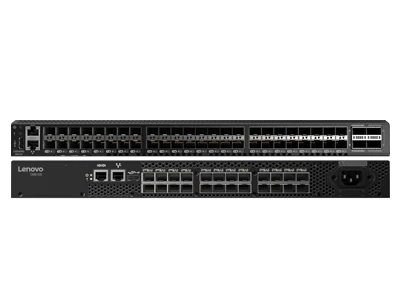If your business heavily relies on data storage and quick data transfer, then a storage area network, or SAN, is likely the best solution for you. Unlike other storage solutions, a SAN is easy to scale as your company grows and offers many features that improve transfer speeds and data security.
A SAN is a dedicated network that connects storage devices to servers. Businesses can use a SAN to improve storage performance and reliability while reducing costs. It is also ideal for businesses with several locations or remote employees, as it offers fast and reliable data transfers between sites. So, SAN is definitely worth considering if you're looking for a storage solution that ticks all the boxes.
Lenovo offers a range of SAN products that can meet the demands of the business. The key is to know what to look for when purchasing them. Take a closer look at some of the most important factors to determine which one is right for you.
What is SAN?
A storage area network (SAN) is a high-speed network of storage devices that can be accessed by computers and servers. SANs are typically used in enterprise-level storage environments, where data is often stored on physical media such as hard disks and tape drives. SANs can provide more flexibility and scalability than traditional storage networks.
The benefits of using a SAN include improved performance, increased flexibility, and enhanced scalability. SANs can also provide other benefits, such as reduced latency, higher data throughput, and improved availability. Storage area networks have become an essential part of many organizations' IT infrastructure.
Understanding SAN definition or what is storage area network will help us to take a right purchase decision.
SAN definition: SAN stands for Storage Area Network. A SAN is a group of computers and storage devices. It is a network that provides high-speed connectivity between computers and storage devices. SANs typically use Fibre Channel or iSCSI protocols to connect to storage devices such as hard drives, solid-state drives, and tape drives.
SANs are often used in enterprise environments where data is constantly accessed and modified. SANs can provide a significant performance boost over traditional storage networks with greater flexibility and scalability.
Importance of Storage Area Network
A storage area network, or SAN, is a key component of any modern IT infrastructure. By consolidating storage into a centralized, easy-to-manage system, a SAN can help to improve performance and reliability while reducing costs.
A SAN provides several other benefits, such as simplifying data backup and recovery, improving disaster tolerance, and enabling advanced storage features such as snapshots and replication.
As data growth continues to accelerate, the need for a reliable and scalable SAN will only become more acute. Thus, implementing a storage area network should be a top priority for any organization looking to stay ahead of the curve.
What are the SAN Benefits
Once you get clear idea about what is SAN. Let us know the benefits of it. SAN offers many advantages over other types of storage, such as direct-attached storage (DAS), including:
- Improved performance: SANs can offer much higher performance than DASs due to their increased bandwidth and lower latency than dedicated storage networks can offer. In SAN environments, storage processing is moved and offloaded to separate networks, improving the system's performance.
- Enhanced Scalability: If you need to expand your SAN, you can easily add new storage controllers, switches, and drives without changing anything on your server. The system can support large deployments of SAN host servers, storage systems, and other devices.
- Greater flexibility: When it comes to the types of storage that can be used and the capabilities of connecting multiple servers to the same storage devices, a SAN can offer a greater degree of flexibility. As a result, storage resources can be utilized more efficiently, and overall costs can be reduced.
- A wide range of management features: In order to provide better resilience, capacity, and data security, SANs support a variety of enterprise-class features, including storage replication, self-healing technologies, data encryption, and data deduplication, ensuring better data retention and security.
- Improved data availability: Storage can be accessed via multiple paths, enhancing availability, serviceability, and reliability. SAN deployments ensure that data can be accessed in multiple ways at any time, so even if some pathways fail due to a down server, other ways can be found.
Types of SAN
There are a few different SAN types, and each has its own set of benefits and drawbacks. In order to choose the best SAN types for your needs, it is crucial to understand what is SAN and what are the different options.
The SAN protocol specifies how switches and devices communicate within the storage area network. The following are the most common types of protocols:
- Fibre Channel over Ethernet accounts for less than 5% of all SANs. This protocol routes FC packets over Ethernet. This reduces SAN infrastructure complexity and improves flexibility. Due to the fact that you use a single device to transfer both storage data and IP packets, switching solutions for SANs and LANs is unnecessary.
- Fibre Channel Over IP can also be referred to as storage tunneling or fibre channel tunneling. Using it, information can be transmitted over IP networks. A relatively affordable method of linking SANs in different locations, it's used by many companies and organizations.
- Fibre Channel Protocol offers faster and more reliable data transfers at a lower cost than Ethernet. As a result, systems using it (such as workstations, mainframes, supercomputers, and displays) are faster and more reliable than local area networks connected through Ethernet.
- Non-Volatile Memory Express over Fibre Channel is a storage protocol and host controller interface that speeds up data transfers between solid-state drives and enterprise and client systems via a PCI express interface.
High-Quality SAN Products by Lenovo
Are you planning on developing a storage area network (SAN)? If so, you'll want to check out what Lenovo has to offer. Lenovo's SANs are designed to offer outstanding performance, reliability, and scalability.
• ThinkSystem DE Series Hybrid Flash Array
ThinkSystem DE Series Hybrid Flash Array is designed for businesses that need high-performance storage but doesn't want to break the bank. The array combines fast flash storage with lower-cost HDDs, providing the perfect balance of speed and capacity. The result is a storage solution that is up to four times faster than traditional hard disk arrays, with the added benefit of being more affordable.
In addition, the ThinkSystem DE Series is easy to manage and scale, making it an excellent choice for growing businesses. With its combination of performance, price, and features, the ThinkSystem DE Series Hybrid Flash Array is a great storage solution for small and medium businesses.
• ThinkSystem DE Series All-Flash Array
If you're looking for high-performance all-flash storage, you'll want to check out Lenovo's ThinkSystem DE Series arrays. These enterprise-grade systems are designed for mission-critical applications and can provide the speed and reliability you need to keep your business running smoothly.
The DE Series offers a variety of features that make it easy to scale and manage your storage, including intuitive software tools and a modular design that makes it easy to add more capacity as your needs grow. With the ThinkSystem DE Series, you can be confident that your data is safe and accessible when you need it.
• Fibre Channel Switches
Lenovo's Fibre Channel switches are designed to provide high-performance storage networking for demanding enterprise applications. Featuring a robust feature set and advanced port density, Lenovo's Fibre Channel switches are ideal for SAN deployments of any size. With support for multiple protocols and features such as Quality of Service (QoS), these switches are designed to meet the most demanding storage networking requirements.
Lenovo's Fibre Channel switches offer a wide range of ports and form factors to fit any environment. Whether you need a standalone switch or a fully redundant system, Lenovo has a solution to meet your needs.
• IP SAN Switches
Lenovo's IP SAN switches offer a scalable, flexible, and cost-effective way to connect storage devices to a network. With support for up to 8 Gbps of data throughput, these switches can meet the demands of even the most demanding applications.
They offer hot-swappable power supplies and fans for easy maintenance. With support for Fibre Channel (FC) and iSCSI protocols, they can be easily integrated into existing storage environments. Whether you're looking to connect a few devices or hundreds, Lenovo's IP SAN switches are an ideal solution.
Let Us Help You
Lenovo offers a variety of SAN solutions that are perfect for businesses that require high data availability and quick data transfers. Our products are designed to provide the best features and performance, so you can rest assured that you're getting the most out of your investment. We have a wide range of options to choose from, so you can find the perfect solution for your specific needs. And if you have any questions, our team is always ready to help.
With Lenovo's great selection of SANs, you're sure to find one that meets your needs. Compare our options and choose the best SAN for your business goals. With quick data transfers and high availability, a SAN is the perfect storage solution for businesses that require fast access to their data.








